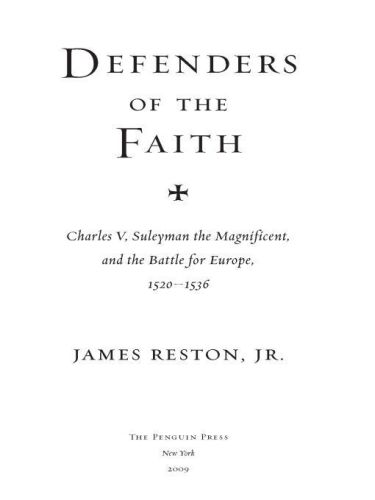
Defenders of the Faith
Charles V, Suleyman the Magnificent, and the Battle for Europe, 1520-1536
کتاب های مرتبط
- اطلاعات
- نقد و بررسی
- دیدگاه کاربران
نقد و بررسی

March 30, 2009
In this vibrant piece of intellectual history, Reston completes the saga of the relationship between East and West he began with Warriors of God
. Combining a historian's attention to detail and a novelist's narrative flair, Reston focuses on the period when the Ottoman Empire came within a hair's breadth of conquering Europe. The Sultan Suleyman swore to accomplish what his father and grandfather had not—conquer the Holy Roman Empire. Standing in his way was an equally ambitious leader, the young Holy Roman Emperor, Charles V. As Reston observes, each faced rebellion and fractiousness within his own empire. Although Charles defeated Suleyman at Güns, now in Hungary, the Turks had spread terror through Europe by moving farther into Christian lands than ever before. By examining this short but crucial span of years, Reston not only brings to life two “Olympian” figures who believed they were carrying out the will of God; he also offers a lucid window onto Renaissance Europe and the foundations of contemporary debates between the West and Islam.

April 1, 2009
The history of an"epic clash of civilizations."
Journalist Reston (The Conviction of Richard Nixon: The Untold Story of the Frost/Nixon Interviews, 2007, etc.) is the author or two previous books about major Christian-Muslim clashes—Dogs of God (2005) and Warriors of God (2001). Here he looks at a turbulent time featuring not one but several brutal confrontations. His Christian protagonist is Charles V (1500–58), who became Holy Roman Emperor thanks to his grandfather, Maximilian I. Charles also inherited the Low Countries from his father and the Spanish Empire from his other grandparents. Opposing Charles was Suleyman I (1494–1566), sultan of the Ottoman Empire under whom it reached the height of its power. Reston stresses that these deeply pious rulers loathed each other less than heretics within their own religion. Charles worked to suppress the charismatic Martin Luther's rebellion against Catholic doctrine. A Sunni Muslim, Suleyman massacred Shi'ites within his realm and repeatedly invaded Shi'ite Persia in an effort to wipe them out. Both efforts failed, but three massive Ottoman invasions of Europe got as far as the gates of Vienna. History would have been vastly different had they succeeded, which almost happened because Charles and a colorful cast of secondary characters—Henry VIII of England, Francis I of France, Luther, several scheming popes—preferred to battle each other. Reston recounts the facts without the breathless dramatics many popularizers cannot resist, but since he is not a professional historian, there are few strong opinions and little deep analysis.
A competent account of a spectacularly eventful historical period.
(COPYRIGHT (2009) KIRKUS REVIEWS/NIELSEN BUSINESS MEDIA, INC. ALL RIGHTS RESERVED.)

May 15, 2009
The years 152036 were filled with political and religious upheaval in Europe. In lucid prose, Reston ("Dogs of War") ably explains the complexities of the period's geopolitics, taking us through Africa, the Middle East, and Europe without losing us on the way. Written for popular consumption, the book describes how the religious divisions between Protestants and Catholics and the political divisions among the Papal States, France, England, and Spain made all of Europe susceptible to the invading Ottoman Empire. The triumphs and failed intrigues of Francis I, Henry VIII, Charles V, Suleyman the Magnificent, Ibrahim Pasha, Martin Luther, and Pope Clement VII opened Europe to Islamic forces, which erached the gates of Vienna before they were turned back. As the title indicates, all of these figures were motivated primarily by their religious convictions. Without explicitly referencing them, Reston helps the lay reader grasp the root causes of religious tensions that exist to this day between Protestant and Catholic, Christian and Muslim, and Sunni and Shiite. Fast-paced and engaging, this is excellent reading for popular audiences. (Index not seen.)Michael Farrell, Reformed Theological Seminary. Lib., Oviedo, FL
Copyright 2009 Library Journal, LLC Used with permission.

May 1, 2009
From the Third Crusade (Warriors of God, 2001) and the Christian reconquest of Spain (Dogs of War, 2005), Reston turns to Ottoman sultan Suleyman the Magnificents attempted Islamic conquest of Austria and Hungary, which culminated in battles at Vienna in 1529 and 1532. He imposes narrative clarity on a kaleidoscopic array of historical events by concentrating on Suleyman and the principal potentates of Latin Christendom involved in the onset of the Reformation: Holy Roman Emperor Charles V, Pope Clement VII, Francis I, and Henry VIII. Reston enlivens his chosen principals movements on the political and religious chessboard and evaluates how they worked out (e.g., badly for the pope, whose authority Martin Luther fractured and whose see Charles sacked). Given the disunity of the Christian monarchs, readers wondering why Suleyman did not prevail may depend on Restons interesting display of fact, description, and narrative to elucidate a pivotal point in history.(Reprinted with permission of Booklist, copyright 2009, American Library Association.)

























دیدگاه کاربران